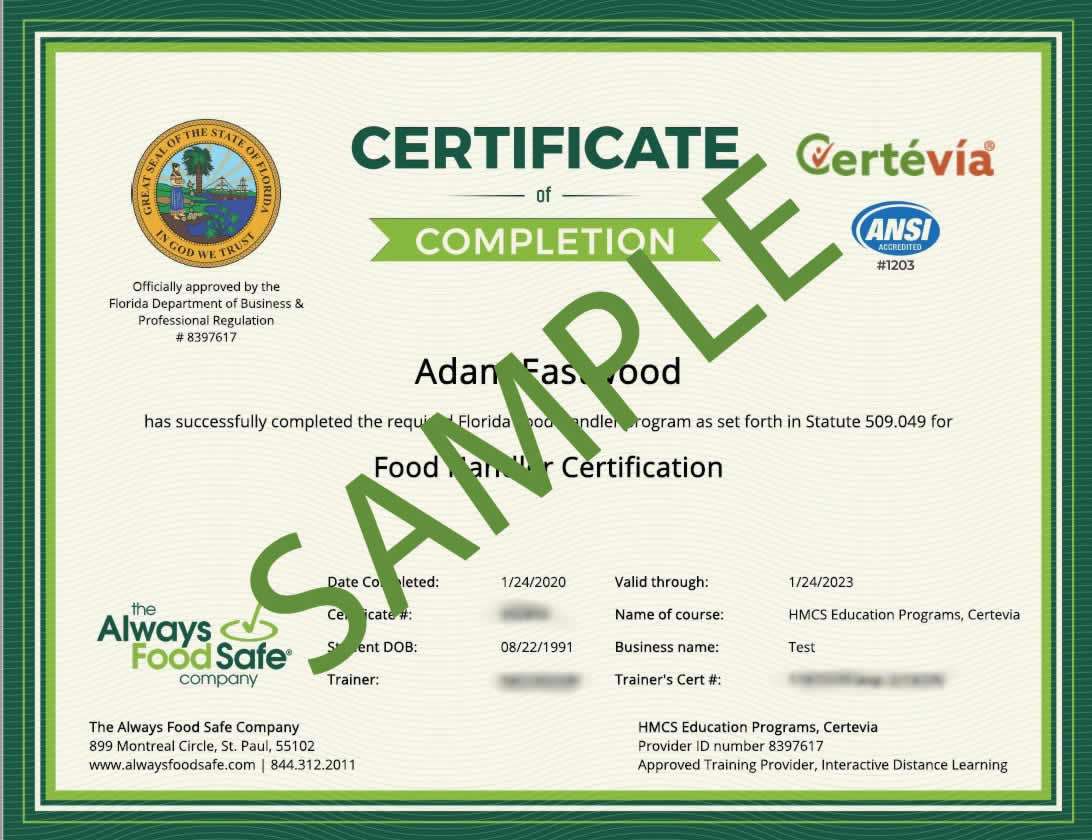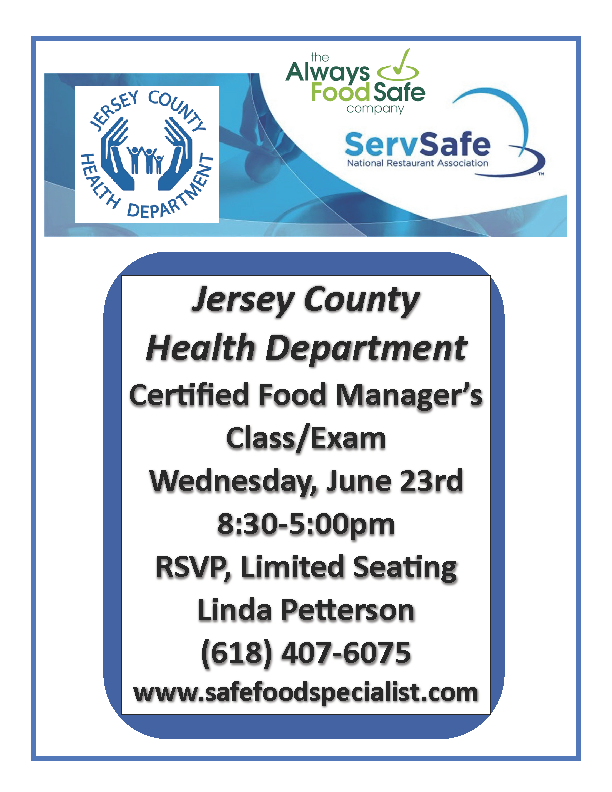Food Manager Certification Overview: Actions for Success
Food Manager Certification Overview: Actions for Success
Blog Article
Qualified Food Manager: The Secret to Safe and Compliant Operations
The duty of a Certified Food Manager (CFM) is increasingly recognized as necessary in maintaining certified and safe procedures within the food service market. Recognizing the full range of their payments raises questions regarding the more comprehensive implications for services and customer trust fund in food safety techniques.
Function of a Qualified Food Supervisor
The duty of a Certified Food Manager is crucial in ensuring food security and conformity within food solution facilities. These specialists are liable for supervising all elements of food handling, prep work, and storage, guaranteeing that facilities abide by health and wellness policies and market standards. Their training equips them with the expertise to recognize possible threats, apply correct food security methods, and preserve sanitation methods.
Qualified Food Supervisors play a crucial role in training and overseeing cooking area staff, instilling a culture of safety and conformity throughout the facility. They conduct normal examinations to recognize areas that require renovation and ensure that restorative actions are implemented swiftly - ServSafe Manager. In addition, they are tasked with developing and applying standard procedure (SOPs) relevant to food security, which function as a guide for employees
Their know-how reaches monitoring food temperature levels, avoiding cross-contamination, and taking care of allergen controls, every one of which are vital to protecting public wellness. Certified Food Supervisors are often the main factor of get in touch with throughout health assessments, representing their facilities and addressing any conformity concerns raised by health and wellness authorities. Inevitably, their dedication to food safety is important for keeping customer trust and safeguarding the track record of food solution organizations.
Importance of Food Safety
Food safety is constantly a leading concern in the food service industry, as it directly affects public wellness and customer self-confidence. Making certain that food is handled, prepared, and kept safely helps to stop foodborne health problems, which can result in serious wellness complications and even fatalities. The economic effects of foodborne episodes can be astonishing, resulting in pricey recalls, lawful actions, and considerable damage to a company's credibility.
Furthermore, food safety and security methods promote a culture of accountability and professionalism and trust within food establishments. When employees are trained in correct food managing methods, they are much more most likely to follow security procedures, which minimizes the threat of contamination. This not just protects customers yet likewise enhances functional efficiency and compliance with local wellness policies.
Customer understanding concerning food security has raised dramatically, causing increased assumptions for transparency and top quality in food service. Facilities that prioritize food safety and security are most likely to get customer trust fund and loyalty, inevitably adding to their lasting success. For that reason, spending in robust food security procedures is not simply a regulatory responsibility; it is a fundamental organization technique that profits both customers and food solution operators alike.
Training and Qualification Refine
Comprehending the training and qualification procedure for food supervisors is crucial for preserving high criteria of food security within any kind of establishment. The procedure usually begins with extensive training programs that cover vital subjects such as foodborne illnesses, appropriate food handling methods, and cleanliness practices. ServSafe Food Manager Certification. These programs can be supplied via numerous styles, including online courses, in-person classes, or workshops, and are made to equip food supervisors with the expertise necessary to avoid food safety threats
Upon completion of the training, prospects have to pass a qualification examination, which analyzes their understanding of food safety and security concepts and regulations. The test is typically carried out by recognized companies, making certain Learn More Here that the certification is recognized and valued within the sector.
Once accredited, food managers are called for to remain current with recurring education and learning and training to maintain their credentials. This may include participating in refresher course courses or joining workshops that attend to brand-new food security methods and regulations. In general, a robust training and accreditation procedure not only enhances the skills of food supervisors but also adds to the total safety and security and conformity of food operations in any type of facility.
Compliance With Rules
Compliance with regulations is an essential aspect of a food manager's obligations, as it guarantees that facilities comply with neighborhood, state, and federal food security standards. These guidelines are developed to mitigate threats related to foodborne ailments and advertise safe food managing methods. A certified food manager (CFM) plays a pivotal role in analyzing and applying these criteria within their procedures.

CFMs need to additionally carry out and develop tracking systems to routinely examine conformity with food safety practices. This might involve routine evaluations, record maintaining, and training sessions for staff to reinforce safe food handling protocols (ServSafe Manager Certification). Additionally, in case of a governing evaluation, a CFM's readiness can considerably affect the result, as they will certainly be accountable for showing adherence to all appropriate standards. Inevitably, effective compliance administration fosters a culture of safety and accountability within food service operations.

Advantages of Hiring CFMs
Employing licensed food managers (CFMs) supplies considerable benefits for food service facilities looking for to enhance their functional efficiency and security requirements. CFMs possess specialized expertise of food safety guidelines, hygiene techniques, and risk management, making certain conformity with federal and neighborhood laws. This experience assists decrease the probability of violations that can cause pricey fines or short-term closures.
Additionally, CFMs play an essential duty in training personnel, fostering a society of food safety and security within the establishment. They implement standardized treatments, screen food managing techniques, and conduct regular audits, significantly minimizing the threat of foodborne diseases. This not just shields customers however likewise improves the establishment's credibility.
In addition, hiring CFMs can cause boosted operational performance. Their training allows team to function better, reducing waste and making the most of efficiency. Establishments with licensed food managers typically experience higher customer contentment, as trained workers are much better geared up to ensure high quality solution and food safety and security.

Eventually, spending in a licensed food supervisor is an investment in the long-term success and sustainability of a food service company website operation, creating a more secure setting for both employees and consumers.
Final Thought
To conclude, the function of a Licensed Food Manager is vital in keeping secure and compliant food service procedures. Through reliable oversight of food handling practices, ongoing personnel training, and adherence to regulative criteria, CFMs play an important role basics in mitigating foodborne disease risks. The financial investment in qualified administration not just enhances functional performance but likewise cultivates a society of accountability, inevitably profiting both the facility and its clients while advertising public health and wellness and safety.
The duty of a Certified Food Supervisor is essential in making sure food safety and compliance within food service establishments.Comprehending the training and certification procedure for food managers is essential for maintaining high standards of food safety within any facility. Overall, a robust training and qualification process not just boosts the abilities of food managers but likewise adds to the general safety and security and compliance of food operations in any type of establishment.
Working with certified food supervisors (CFMs) provides substantial benefits for food service facilities seeking to boost their operational efficiency and security requirements. Facilities with certified food supervisors typically experience higher consumer contentment, as well-trained workers are better outfitted to guarantee high quality solution and food security.
Report this page